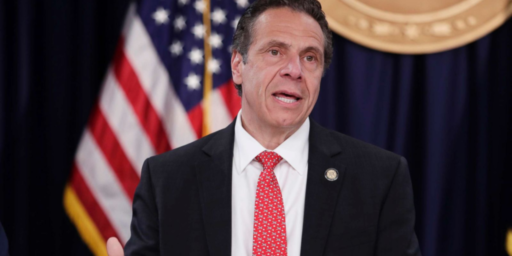Final Costs Of Hurricane Sandy Could Exceed $60 Billion
It’s been just under a month since the East Coast was hammered by Hurricane Sandy and, while the initial problems of power outages and gasoline shortages have largely cleared themselves up, much rebuilding remains to be done, and damage estimates are just starting to roll in.
Just a few days ago, New Jersey Governor Chris Christie said that his state’s damages are already estimated to be near $30 billion:
NEW YORK, Nov 23 (Reuters) – Superstorm Sandy caused at least $29.4 billion in overall damage in New Jersey, according to a preliminary analysis released by Governor Chris Christie’s office Friday.
The estimate of the damage caused by the storm, which ravaged the Northeastern U.S. coastline late last month, includes personal property, business, infrastructure and utility damage, Christie said in a statement.
The statement said the preliminary cost estimate is “inclusive of aid received to date and anticipated from federal sources,” including the Federal Emergency Management Agency and the Small Business Administration. Christie said it was a “conservative and responsible estimate” that could be revised higher, Christie said.
Last week, New York Governor Andrew Cuomo said he planned to ask the federal government for $30 billion in disaster aid for the state. Earlier this month, New York City Comptroller John Liu said the storm was costing New York City $200 million a day in lost economic activity, with that amount likely to top out at about $1 billion.
“This preliminary number is based on the best available data, field observations and geographical mapping, and supported by expert advice from my Cabinet commissioners and an outside consulting company,” Christie said in the statement Friday.
And, today, New York’s Andrew Cuomo said damage costs in his state are likely already at the $30 billion level:
ALBANY, N.Y. — Top political leaders in New York put their heads together Monday on big requests for federal disaster aid as Gov. Andrew Cuomo announced that Superstorm Sandy ran up a bill of $32 billion in the state and the nation’s largest city.
The cost is for repairs and restoration and does not include an additional accounting of over $9 billion to head off damage in the next disastrous storm, including steps to protect the power grid and cellphone network.
“It’s common sense; it’s intelligent,” Cuomo said. “Why don’t you spend some money now to save money in the future? And that’s what prevention and mitigation is.”
New York Mayor Michael Bloomberg had announced earlier in the day that Sandy caused $19 billion in losses in New York City — part of the $32 billion estimate Cuomo used.
New York taxpayers, Cuomo said, can’t foot the bill.
“It would incapacitate the state. … Tax increases are always a last, last, last resort.”
Cuomo met with New York’s congressional delegation to discuss the new figures and present “less than a wish list.” The delegation, Cuomo and Bloomberg will now draw up a request for federal disaster aid.
States typically get 75 percent reimbursement for the cost of governments to restore mass transit and other services after a disaster.
The most basic recovery costs for roads, water systems, schools, parks, individual assistance and more total $15 billion in New York City; $7 billion for state agencies; $6.6 billion in Nassau County and $1.7 billion in Suffolk County, both on suburban Long Island; and $527 million in Westchester County and $143 million in Rockland County, both north of New York City, according to a state document used in the private briefing of the delegation and obtained by The Associated Press.
That’s $60 billion between just two of the states impacted by the storm. The total number will likely be larger. By way of comparison, Hurricane Katrina cost and estimated $105 billion in damages in 2005.






The obvious answer, especially for expenditures in which you “spend some money now to save money in the future”, is a bond issue.
However, I recognize that Gov. Cuomo is intent on federal money to pay for the damage of the hurricane and its aftermath. I think that whether that’s reasonable is a discussion that’s worth having.
Illinois has higher unemployment than New York, suffered more during the late recession than New York did, has bigger fiscal problems at the state level, and receives less federal money relative to federal taxes paid than New York does. Is it reasonable to tax Illinoisans on behalf of New York? For which of the expenses is it reasonable?
We have weather-induced problems here in Illinois, too, most recently the drought. Should New Yorkers be taxed to pay for the impact of that on Illinois? If the extreme weather is caused even in part by anthropogenic climate change, I think it’s worth mentioning that the proportion of power that we use here that doesn’t produce greenhouse gases is significantly greater than that in New York.
If the issue is importance to the national economy, I think that commodities trade is arguably more important to the national economy than the New York Stock Exchange.
I think there’s a drastic difference between the federal government subsidizing poor states like Mississippi or Louisiana and treating rich states like New York or Illinois the same way. I’m interested in what others think.
@Dave Schuler: “I think there’s a drastic difference between the federal government subsidizing poor states like Mississippi or Louisiana and treating rich states like New York or Illinois the same way. I’m interested in what others think.”
I think that we are one nation, one people. And when part of our nation is wounded, we all come together to make it right. Do we tax the Illinoisan to help New York? No, we as Americans contribute via our taxes to make sure the entire country is whole.
Of course, we’ve been told for decades now that even the idea of taxes is evil. That the notion of the American people working together to benefit the country as a whole is socialism. Hell, St. Rush even says when members of a football team work together to move the ball down the field it’s a form of socialism.
This is the gift of the Republican party. This is the gift of the eternal adolescents calling themselves libertarians.
New York wasn’t injured in that storm. New Jersey wasn’t injured in that storm. The United States of America was injured in that storm, and the United States of America neeeds to come together to fix it.
Wait! What is this rebuilding? We have if from good authority, Mayor Bloomberg himself, that the storm was due to global warming. As such, rebuilding is folly. How much to relocate? Transform the barrier islands into barriers and the inundated coastal areas into large parks with limited infrastructure.
Before we Americans smart enough not to live in inundation zones pay for this, we either want admission the climate change link is bogus or the new disaster areas will be made into protective beach and barrier islands with no permanent structures.
@JKB: That’s lovely. Gloat at the suffering and deaths of people who conceivably have politics that don’t agree with yours. No wonder your party got trounced in the last election — what human being would vote for such a loathesome philosophy?
Do these figures include the $300 per night hotel rooms that FEMA gave out to people ?
If we can rebuild Florida every three years for hurricanes, we can certainly afford to help out NY/NJ this time around. My guess is that the states that contribute the least will complain the most, as usual.